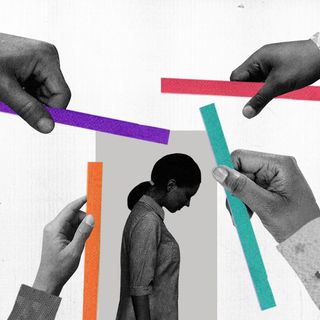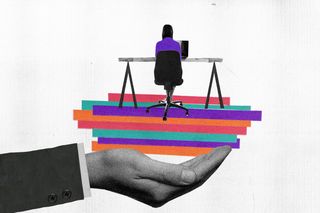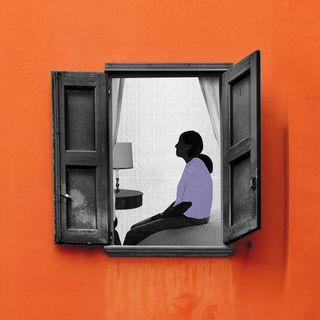
How Peer Support During the Pandemic Redefined Kindness and Empathy at Work
The lockdown “humanized” colleagues as people knew the context of each others’ lives — allowing circles of kindness to thrive.

In order: A call log of unsaved numbers, a bedside table stacked with medicines, a house in chaos, an unnerving heat pressing on the mind and body. Shruti remembers these instances – disjointed but vivid – from the second wave of Covid19. Her mother had been running a fever for seven days, but the nationwide paucity of RT-PCR tests made it impossible for Shruti to find answers.
“This particular time period was exhilarating and exhausting… I remember stressing out and ranting so much to my workplace peers,” the 24-year-old says. In real-time, these “work friends” embraced her anxiety and stress; they helped find tests, doctors, resources, and offered emotional support.
This was the first ray of kindness Shruti saw through the crisis – one which has come to be called a “crime against humanity.”
***
Stories like Shruti’s sprouted organically everywhere during the pandemic. As “work from home” morphed into “home at work,” colleagues and peer networks became sources of emotional support. Contrast this with a time before Covid19, where workplace friendships were stereotypically only associated with coffee/smoke breaks, water-cooler conversations, plain old venting, after-work socialization.
These bonds evolved over the last two years, nestled between the demands of the modern workplace. “The bond wasn’t restricted to just work and/or work-related. It became more personal and acted as emotional support in isolation,” Shruti notes. In the most direct sense, they helped navigate the burdens of the pandemic.
All anecdotes of office groups doubling as Covid resource platforms hint at one idea: the personal had become professional. For Ria Chopra, 23, this is also the one thing that changed the dynamics of the workplace altogether. “…my colleagues rallied together during the second wave, helping each other look for medicines, hospital beds, oxygen — displaying admirable empathy and care,” she says.
This support would arrive in the form of a text message from colleagues; a simple “I’ll cover for you”; “No Calls Fridays”; and its many mutations.
Zeb Hasan, 25, sets aside an hour every evening just to sound off about work and life with a colleague. “It came up as a result of work from home,” he says, referencing the regularly-programmed “ranting sessions.” “I decided to reach out to someone and it certainly helped,” he says. “Because I felt heard.” Research shows versions of these “rants” help label feelings, reducing the activation of our brain’s alarm system, making one more mindful.
Related on The Swaddle:
What Do We Lose When We Don’t Inhabit Physical Spaces Like Offices, Universities?
These unofficial channels of communication outside work also make room for accommodations within the workplace. Zeb remembers picking up for someone when they had to take an off or someone else picking up for Zeb when he had to attend a wedding. Even Ria notes how it has become standard practice to avoid unnecessary meetings, excuse late replies, coordinate leaves, or take on/pass on work depending on their bandwidth in synchrony. “We’ve just become understanding of each other’s needs,” she says. The flexibility, a rightful ask during the pandemic, works to address the greater mental health burden during the pandemic.
“Peer support systems make it possible to create a safe space for people to share their experiences in a way that makes them feel heard and their experience acknowledged,” Samriti Midha, a clinical psychologist and psychotherapist, says. This “validation,” as Midha calls it, is multidimensional; it can bolster people’s self-worth, build a sense of solidarity, and “consequently empower them to move forward.” More so during a pandemic when chronic isolation and stress threaten all these. Tara*, 26, for example, found the strength to leave a toxic workplace once she connected with her peers while working from home.
For Ria Chopra, 23, this peer support looked more like friendship with an older mentor. Having a friend, or “work wife” as Ria calls her, who in essence is going through the same stresses and work experience as you is freeing. People can “rant, discuss, just talk, without having to give layers of explanation,” Ria says. Plus it makes the workplace feel more welcoming – even if abstractly.
“In the workplace, really knowing that you have someone in your corner in a high-stress time, can alleviate the pressure and the tension and also encourage collaboration,” explains Israa Nasir, a counseling psychologist who specializes in workplace wellness.
Rants and other unofficial communication channels work to create a sense of community – that the individual is not the only one who’s struggling. “Or that there’s nothing inherently wrong with me that I can’t handle this, but other people are also having a hard time handling it,” Israa notes.
Although these emotional support systems were always there in some way, during the pandemic, “the equations expanded because workplace peers inevitably became a part of our physical and emotional space,” Shruti notes. It may have helped make people feel closer to each other, especially as grief and trauma unwinded like a common thread.
Moreover, when work entered the home, it witnessed a part of our personal lives otherwise hidden. It was impossible not to see children running around, partners cooking, the clanks of utensils, the dog demanding immediate attention – these strands of life work to “humanize people,” Israa points out.
On video calls, people would see others have “more obligations that you just never thought of before – [things] that can get in the way of them doing the work… It creates more context as to why people are the way they are.”
***
Just like Hindi cinema believes that “ladka ladki dost nahi ho sakte” (“men and women can’t be friends”), Shruti firmly thought a friendship at the workplace was never one of substance. “It’s rare due to the embedded notions that one can’t have friends at their workplace.”
Shruti argues this misconception is a capitalist byproduct – where one constantly looks at workplace peers through the lens of competition rather than support. She isn’t wrong; competition is a big red seal attached to the capitalist economy. Competing people are meant to produce “great work” at low cost, dismissing any scope for friendships. Over the years, this has translated into a culture of withdrawal. Research shows many professionals, especially men (only heterosexual men were surveyed in this case), do not disclose their personal commitments to their colleagues for fear of being judged as less competent. In the end, if having a busy lifestyle, rather than a leisurely one, is an “aspirational status symbol,” bonding with peers seems counterintuitive.
Related on The Swaddle:
Why Second‑Wave WFH Burnout Feels So Different From Regular Work Stress
But simultaneously, a growing corporate culture rushes to term the workplace as one’s “family.”
“Whenever this term is abused, it’s often used to mask the lack of boundaries. You know, if your boss feels like they can call you at 10 p.m. and then say, oh, yeah, it’s because we’re like family,” Israa notes. “The concept of closeness and the kind of supportive family provides is weaponized for the benefit of the workplace.” A worrying number of studies point to how the “work is family” insistence leads to worker exploitation; spending unreasonable hours on the job, working in the interest of the company. In The Character of a Corporation, authors note the “family culture” pushes employees to “help before they’re asked” in the most selfless manner. This exaggerated dedication can be quite toxic.
The peer networks that popped during the pandemic can subvert this culture. Your colleagues can still be a part of your life beyond office — but not in the way we originally imagined. These channels mean one can depend on your work, work colleagues, and mentors for emotional support without really blurring the lines between personal and professional life. More importantly, “you can access emotional support in the workplace in an appropriate way,” Israa adds. The workplace can still be something that you leave to go back to the rest of your life.
Ria thinks the context of the pandemic, when framed in the language of toxic work culture, has recalibrated the dynamics. “There is an understanding that we are a team, and doing these things for others creates an environment where the same compassion will be shown to us.”
Instead of calling them family, calling work friends your “tribe” can be productive, argues Kuntal Vora, a Mumbai-based clinical psychologist. “In a tribe, everyone’s roles and expectations are set through mutual understanding, so overstepping boundaries can be avoided.”
***
These aren’t tectonic shifts in the workplace, but slow movements characterized by consideration and care. This pattern is important to keep track of as people work – in the office or at home – while anticipating a third wave. Moreover, the “Great Resignation” discourse has brought to life the increased burnout, mental health issues, and lack of workplace accommodations.
Vora notes that, for many working people, “the greatest need is to be treated as humans – rather than machines or somebody who is only there to achieve targets.”
The modern work culture, one marked by the pandemic, thus stands at an important junction. These peer support systems do not have to be a temporary visa in the world of accommodation and respect at work. They can be a permanent fixture. For Ria, a “kind” workplace would see itself for what it is — “a part of people’s lives, a source of income, and an outlet for productivity; not something that needs to become an employees’ entire life.”
Shasta Nelson, the author of The Business of Friendship, a book about making friendships at work, carries one hope as we move forward: “We’ve watched vulnerability go up, and I’m hoping that will carry on even when we’re back at the office.”
Perhaps, we all can get by with a little help, and kindness, from our friends.
Saumya Kalia is an Associate Editor at The Swaddle. Her journalism and writing explore issues of social justice, digital sub-cultures, media ecosystem, literature, and memory as they cut across socio-cultural periods. You can reach her at @Saumya_Kalia.
Related


New Evidence Supports the Use of MDMA – the Drug in Ecstasy – in PTSD Treatment
